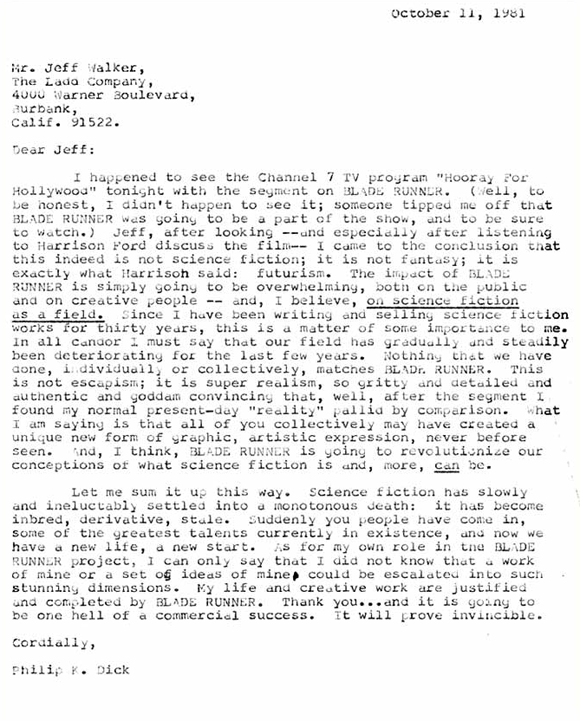zeph’s pop culture quiz #30

Who is escaping by that daring jump out of the window? And from where is he escaping?
Just leave a comment with your educated guess—you can ask for additional hints, too. [Leaving a comment is easy; just click the ‘Leave a comment’ at the end of the post and fill in the form. If it’s the first time you post a comment, it will be held for moderation. But I am constantly checking, and once I’ve approved a comment, your next ones won’t be held, but published immediately by the system.]
↵#29 what is switched? somehow went unnoticed, probably because I have posted it on last Tuesday instead of Monday—I apologize for this, but I am somewhat offline these days. Nevertheless, now you got two riddles to sink your teeth into.
teliasonera’s black boxes
Here’s the timely follow-up to ↵heretics house tripoli, an hour-long feature by the Swedish news show Uppdrag Granskning, investigating the entanglement of Swedish telecom giant ↑TeliaSonera with authoritarian regimes—especially in ex-Soviet states. From ↑Eva Galperin’s write-up at EFF:
According to a recent investigation by the Swedish news show Uppdrag Granskning, Sweden’s telecommunications giant Teliasonera is the latest Western country revealed to be colluding with authoritarian regimes by selling them high-tech surveillance gear to spy on its citizens. Teliasonera has allegedly enabled the governments of Belarus, Uzbekistan, Azerbaijan, Tajikistan, Georgia and Kazakhstan to spy on journalists, union leaders, and members of the political opposition. One Teliasonera whistle-blower told the reporters, “The Arab Spring prompted the regimes to tighten their surveillance. … There’s no limit to how much wiretapping is done, none at all.”
heretics house tripoli
Much has been said and written about the role of social media and the Internet during the Arab Spring. Especially the liberating potentials of these technologies are discussed, even anthropologists are belabouring the topic. But, and that’s the ↵core theme of cyberpunk, technologies are fundamentally ambivalent. Just yesterday ↑Jamming Tripoli: Inside Moammar Gadhafi’s secret surveillance network by Matthieu Aikins was published by Wired:
[The] activists would suffer greatly at the hands of Gadhafi’s spy service, whose own capabilities had been heightened by 21st-century technology. By now, it’s well known that the Arab Spring showed the promise of the Internet as a crucible for democratic activism. But, in the shadows, a second narrative unfolded, one that demonstrated the Internet’s equal potential for government surveillance and repression on a scale unimaginable with the old analog techniques of phone taps and informants. Today, with Gadhafi dead and a provisional government of former rebels in charge, we can begin to uncover the secret, high tech spying machine that helped the dictator and his regime cling to power.
Matthieu Aikins’ article is a deeply researched wonderful piece of journalism on Gadhafi’s secret high tech measures of information control. Matthieu doesn’t just do justice to real people and to technology’s ambivalence, but we also have the proverbial (western and/or international) evil corporations who furnished the means:
“Massive intercept” technology, like countless other innovations of the West’s military-industrial complex, has now become cheap, small, and simple enough to export as a commercial, off-the-shelf technology, for sale to any government that can cough up a few tens of millions of dollars. Today you can run an approximation of 1984 out of a couple of rooms filled with server racks. And that’s precisely what Libya’s spies did—and what dictatorships all around the world continue to do.
UPDATE (13 December 2012):
Some on-topic ↑thoughts by Warren Ellis and The Guardian on ‘↑The Assad Emails.’
what is switched?
zeph’s pop culture quiz #29
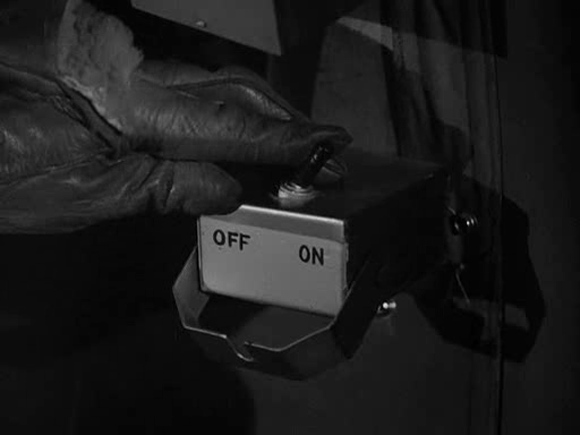
What is caused by using the switch?
Just leave a comment with your educated guess—you can ask for additional hints, too. [Leaving a comment is easy; just click the ‘Leave a comment’ at the end of the post and fill in the form. If it’s the first time you post a comment, it will be held for moderation. But I am constantly checking, and once I’ve approved a comment, your next ones won’t be held, but published immediately by the system.]
UPDATE 1 (07 June 2012):

Now that I am ↵back online, here is a very direct hint, so that you finally can solve #29 …
UPDATE 2 (08 June 2012):
Hm, the above hint wasn’t strong enough, it seems—so here are two more. The first one is in more or less direct connection to the switch in question: What are they listening to?

The second one concerns the backstory told in flashbacks: Where are they coming from? Obviously they are rescued at sea. Where is the vessel, the crew of which is rescuing them in the screencap below, headed to? If you can answer that, you’ll know the title of the movie.
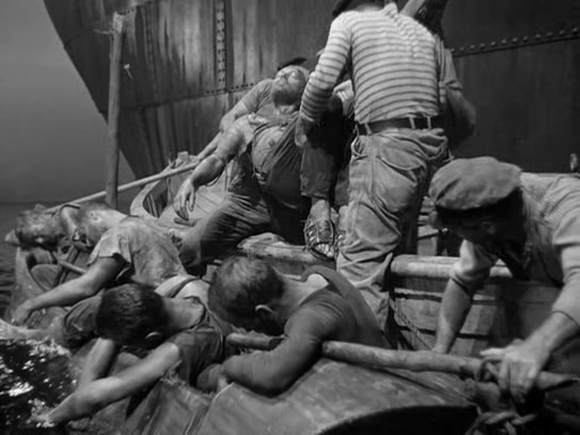
UPDATE 3 and solution (10 June 2012):
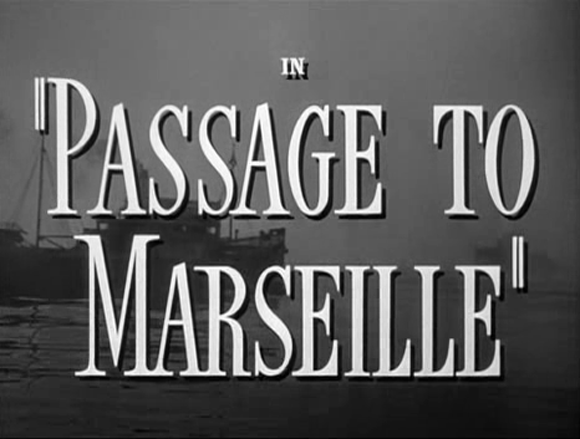
All right, now it’s been too long, here’s the solution:
For his ‘↑Passage to Marseille‘ (1944) director Michael Curtiz reunited a substantial part from the cast of ‘↑Casablanca‘ (Curtiz 1942). Namely: Humphrey Bogart, Claude Rains, Peter Lorre, Sydney Greenstreet, Helmut Dantine, Corinna Mura, Monte Blue, Adrienne D’Ambricourt, Jean Del Val, Charles La Torre, Louis Mercier, Georges Renavent, and Hans Heinrich von Twardowski.
Like in ‘Casablanca’ the Free French during World War II are at the center of the plot. Jean Matrac (Bogart) serves as a bombardier with a Free French bomber squad operating from the United Kingdom. By the switch depicted in the first screencap he releases the bombs from their bay. So, in a way, he switches destruction on. The second screencap depicts a German anti-aircraft reconnaissance detail listening for the Free French aircrafts approaching. All of this is part of the outermost timeframe of the movie’s narrative. Starting from there the background stories of Matrac and his close comrades are told by nested flashbacks. The third screencap stems from the second timeframe. Matrac, Marius (Peter Lorre), Garou (Helmut Dantine), Petit (George Tobias), and Renault (Philip Dorn)—all seemingly shipwrecked, adrift in a small boat in the Caribbean—are safed by the steamer ‘Ville de Nancy’ … on its way to Marseille. Aboard the steamer more flashbacks are told and the whole story unfolds …
brand on drugs
who is descending?
zeph’s pop culture quiz #28
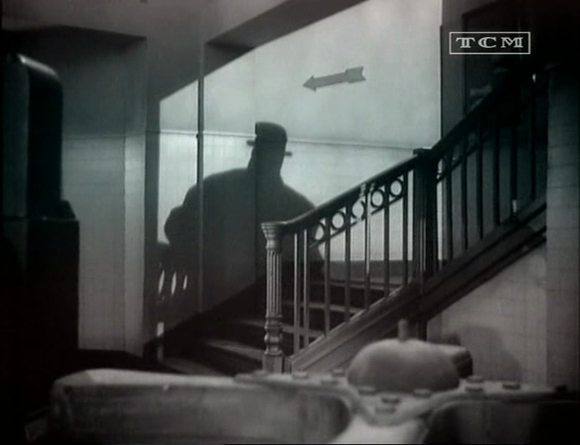
Two people are running down a staircase—why and who are they?
Just leave a comment with your educated guess—you can ask for additional hints, too. [Leaving a comment is easy; just click the ‘Leave a comment’ at the end of the post and fill in the form. If it’s the first time you post a comment, it will be held for moderation. But I am constantly checking, and once I’ve approved a comment, your next ones won’t be held, but published immediately by the system.]
what is observed?
zeph’s pop culture quiz #27
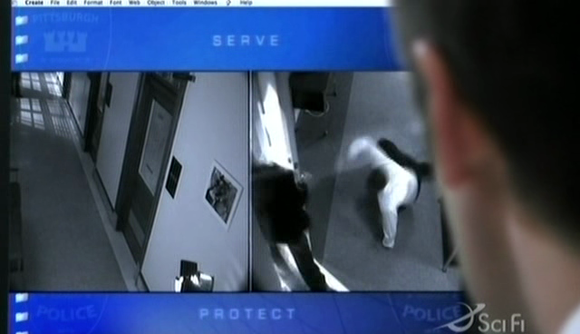
What strange occurence does the man checking surveillance tapes observe?
Just leave a comment with your educated guess—you can ask for additional hints, too. [Leaving a comment is easy; just click the ‘Leave a comment’ at the end of the post and fill in the form. If it’s the first time you post a comment, it will be held for moderation. But I am constantly checking, and once I’ve approved a comment, your next ones won’t be held, but published immediately by the system.]
me on wikipedia
This is in order to prevent anyone assuming that my vanity has gone straight through the ceiling. I just discovered that there is an entry called ↑Cyberanthropology at the German Wikipedia. To my surprise within this entry there is an inside-Wikipedia link ↑Alexander Knorr (Ethnologe) [(social/cultural anthropologist)]. And indeed, since 25 April 2012 there is an entry at Wikipedia on yours truly [I am awaiting its speedy deletion ;-]. Someone started the thing and meanwhile four other people worked on it. Till now it’s only four sentences long—and here my question: Should I, as time will permit, myself enlarge it? Frankly, somehow I do shy away from that.
droids must eat
blade runner letter
On 11 October 1981 Philip K. Dick wrote a letter to Jeff Walker of the Ladd Company concerning the movie ‘Blade Runner’ (Scott 1982). Just recently ↑it has been published on philipkdick.com:
